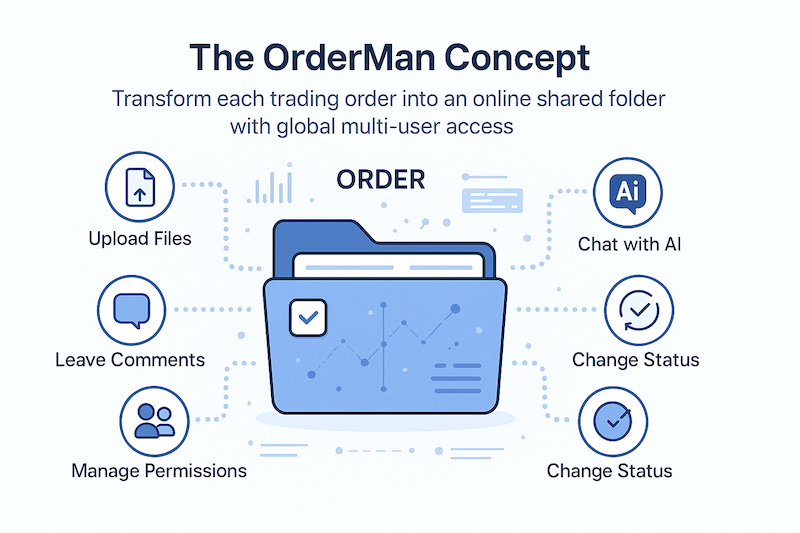
How OrderMan Revolutionizes Foreign Trade Order Management: The Power of File Management and Message Boards
中文版In the foreign trade industry, order management is a complex and critical task involving multi-party collaboration, document exchange, and real-time communication. Traditional methods like email or Excel often lead to lost files, delayed communication, and permission chaos. OrderMan transforms this process by turning each trade order into a globally accessible digital folder, integrating file management, message boards, permission control, status updates, and AI-driven order inquiries. This article explores OrderMan's innovative file management and message board features, highlighting how they address common pain points for foreign trade businesses in Hong Kong and Taiwan.
Common Pain Points in Foreign Trade Order Management
Foreign trade businesses in Hong Kong and Taiwan, from small trading companies to e-commerce platforms, frequently face the following order management challenges:
- Disorganized File Management: Order-related documents (e.g., contracts, product images, shipping forms) are scattered across emails or local drives, making them hard to access and prone to loss.
- Inefficient Communication: Collaboration among customers, factories, and trading companies relies on emails or messaging apps, resulting in fragmented conversation records.
- Permission Management Issues: Different users (e.g., customer orderers, factory followers) require varying levels of file access, but traditional tools struggle to enforce precise controls.
- Cumbersome Information Retrieval: Checking order statuses or historical records involves sifting through multiple files or contacting others, wasting time and reducing efficiency.
OrderMan's core design—treating each order as a digital folder—directly tackles these pain points, offering a centralized, collaborative platform for trade businesses.
OrderMan's Core Innovation: Orders as Digital Folders
OrderMan redefines foreign trade order management by transforming each order into a globally accessible digital folder, equipped with the following key features:
1. Seamless File Upload and Management
Every order has a dedicated "folder" where users can upload relevant files, such as product specifications, packaging photos, or invoice copies. Files are stored centrally, accessible globally, eliminating concerns about loss or version conflicts.
2. Message Boards for Instant Communication
Each order includes a built-in message board, allowing users (e.g., trading company admins, customer orderers, factory followers) to communicate directly on the order page. All messages are saved chronologically, making discussions easy to track.
3. Granular User Permission Management
OrderMan supports six user roles (Super Admin, Trading Company Admin, Customer Orderer, etc.), with precise permission settings for file access and editing. For example, customer orderers can upload files but not delete them, while factory followers can only view assigned order files.
4. Dynamic Status Updates
Order statuses (from "Ordered" to "Delivered") can be updated in real time by authorized users, with changes automatically logged to keep all parties informed.
5. AI-Powered Order Inquiries
OrderMan's AI Q&A feature enables users to query order details using natural language, such as "What are the latest files for this order?" or "What was the last message?" The AI provides instant answers, bypassing manual searches.
These features turn order management into a unified digital workspace, enabling Hong Kong and Taiwan trade businesses to collaborate more efficiently.
Deep Dive: File Management and Message Boards in Action
1. File Management: Centralized and Transparent
OrderMan's file management feature consolidates all order-related documents into a secure cloud-based "folder," addressing the issue of scattered files. Key applications include:
- Upload and Access: Users can upload files (e.g., product images, shipping documents) at any time and view them instantly via the order details page. Files support multiple formats (PDF, images, etc.), accessible globally.
- Version Control: Each file update is logged as a new version, preventing overwrite errors. For instance, a factory follower's latest packaging photo coexists with older versions for easy comparison.
- Permission Control: Role-based permissions ensure security. For example, customer orderers can upload product images, but only trading company admins can delete files, safeguarding data integrity.
Case Study: A Hong Kong trading company collaborating with a Taiwan factory uses OrderMan's file management to store all order documents—design blueprints, contracts, and invoices—in one order folder. Factory followers download the latest files directly, eliminating repetitive email exchanges and saving at least 20% in communication time.
2. Message Boards: Real-Time, Trackable Communication
OrderMan's message board feature centralizes order-related communication on the order page, replacing fragmented emails or messaging apps. Key benefits include:
- Centralized Communication: Messages are displayed chronologically, like a chat log, allowing users to quickly review discussion progress.
- Role Identification: Each message shows the sender's role and name (e.g., "Customer Orderer - Ms. Lin"), ensuring transparency.
- Instant Notifications: New messages trigger system alerts, prompting timely responses from relevant users, such as trading company admins.
Case Study: A Taiwan e-commerce platform handling cross-border orders uses the message board to streamline communication. A customer orderer asks, "Can the product packaging be customized?" via the board, and the factory follower responds the same day with sample images. All discussions are clearly recorded, reducing order processing time by 30%.
3. AI Q&A Enhances File and Message Management
OrderMan's AI Q&A feature boosts the usability of file management and message boards. Users can query order details using natural language, such as:
- "What files are in this order?": The AI lists all uploaded files with their upload dates.
- "What's the latest message?": The AI displays the most recent message and its sender.
- "How do I upload an order attachment?": The AI provides step-by-step guidance for new users.
Case Study: A finance staff member at a small Hong Kong trade company asks, "Where's the invoice file for this order?" The AI directs them to the file section on the order details page, saving search time.
Solving Pain Points: How OrderMan Transforms Trade Order Management
OrderMan's file management and message board features directly address the pain points of foreign trade businesses:
- Lost or Scattered Files: All files are centralized in the order folder, globally accessible, eliminating loss or redundant transfers.
- Communication Delays: The message board offers instant, transparent communication records, reducing misunderstandings and wait times.
- Permission Confusion: Granular role permissions ensure files and messages are accessible only to authorized users, protecting trade secrets.
- Inefficient Queries: The AI Q&A enables rapid access to order information, bypassing manual searches through files or messages.
These benefits resonate with the needs of Hong Kong and Taiwan trade businesses. For instance, Hong Kong companies collaborating with Asian suppliers can rely on OrderMan's digital folder model to keep files and communications organized, while Taiwan e-commerce platforms use the message board to confirm order details with clients, boosting satisfaction.
OrderMan vs. Traditional Tools and Salesforce
Compared to traditional tools (e.g., email, Excel) and Salesforce, OrderMan's file management and message board features are better suited for foreign trade order management:
| Feature/Aspect | OrderMan | Traditional Tools | Salesforce |
|---|---|---|---|
| File Management | Centralized cloud folder, supports version control and permissions | Scattered across emails or drives, no version control | Supports file management, but requires module configuration |
| Message Board | Built-in real-time message board, clear communication records | Relies on emails or chat apps, fragmented records | Offers communication tools, but requires customized workflows |
| AI Q&A | Tailored for order management, quick file and message queries | No AI capabilities | Offers AI (e.g., Einstein), but generalized, not order-specific |
| Ease of Use | Intuitive interface, no training needed | Cumbersome, requires manual organization | Requires professional setup, steep learning curve |
| Cost | Affordable, SME-friendly | Free or low-cost, but inefficient | High cost, suited for large enterprises |
OrderMan stands out for its focus and ease of use. Unlike traditional tools, it offers a centralized digital solution; compared to Salesforce, it avoids complex configurations and unnecessary CRM features, making it ideal for small and medium-sized trade businesses in Hong Kong and Taiwan.
OrderMan's file management and message board features provide a modern, collaborative platform for foreign trade businesses, transforming complex order processes into a simple, transparent workspace. Whether you're a Hong Kong trading company or a Taiwan e-commerce platform, OrderMan helps you overcome file disorganization, communication delays, and permission challenges, empowering your team to work smarter and keep clients happier.
Try it for free now, https://orderman.cc/demo and experience how OrderMan revolutionizes your foreign trade order management! Want to explore more feature details? Contact our team for a personalized demo!
Frequently Asked Questions
Q: How does OrderMan's file management ensure data security?
A: OrderMan uses role-based permissions and data isolation to ensure only authorized users can access or edit order files, protecting trade secrets.
Q: Are message boards suitable for multi-party collaboration?
A: Yes, the message board supports real-time communication among multiple users, with all records centralized for easy collaboration between trading companies, clients, and factories.
Q: What order information can the AI Q&A query?
A: The AI Q&A can retrieve file lists, message records, order statuses, and provide operational guidance, helping users resolve issues quickly.
